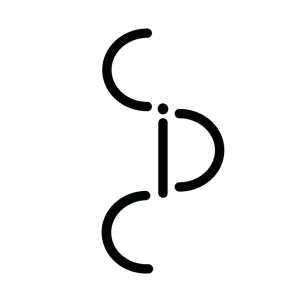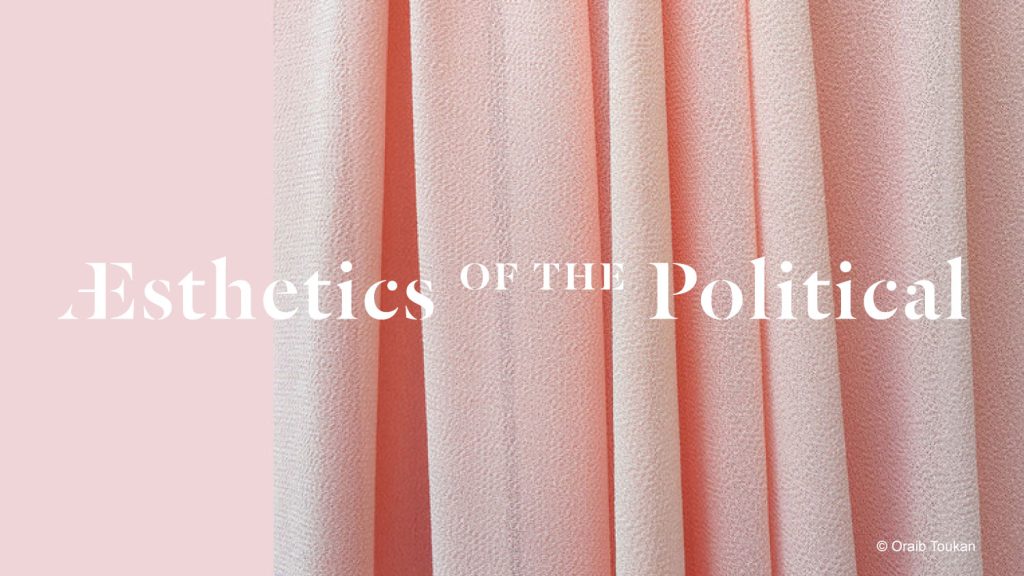Introduction
Politics is about what we see and what we can say about it, about who has the competence to see and the quality to say, about the properties of spaces and the possibilities of time.
It is from this that we can pose the question of aesthetic practices, in the sense in which we understand it, i.e. the forms of visibility of art practices, the place they occupy, what they do in the eyes of the common.’ – Jacques Rancière
For many years, SoundImageCulture, SIC has been developing audiovisual works at the crossroads of borders and languages, supporting and organizing a growing community of artists.
Organized by a collective of filmmakers as a laboratory for creative thought, engaged in intercultural, bi-communal ethical reflection, SIC is attentive to new artistic reflections and trends.
A growing conversation is taking place in Belgium about the decolonization of images and stories. The political roles of new forms. About the resilience of artistic practices in a changing world.
Today, we’d like to create a shared space for artists and audiences to reflect together on the aesthetic choices artists make when exploring this subject. We will contextualize the works and their forms beyond a simple analysis of thematic or socio-political narratives.
We would like to reflect on how the artist’s critical thinking manifests itself in the form, the positions of the artists in the aesthetics of their works.
What we have learned from thinkers and practitioners working to confront and disrupt these power dynamics we face today is that language (speech, debate) is an essential part of the process.
By talking with artists about how critical thinking plays into their work, we build a lexicon of artistic languages used to “unpack” power and hegemony.
Building on the essence and experience of SIC’s work in creating intimate spaces for the development of artistic works, this program extends this intimacy in the form of a public program of reflection.
At different times of the year, we offer spaces, where new forms will be crystallized through exchanges. Moments where experiences, both collective and specific, will be articulated through debates, screenings and performances, offering us the possibility of designating common articulations.
Each event will be organized on a different thematic line which brings together works presented to the public, followed by a discussion with the artists and the audience. For each event, we are inviting international practitioners to join Belgian artists, including those who currently and previously participated in the SoundImageCulture program.
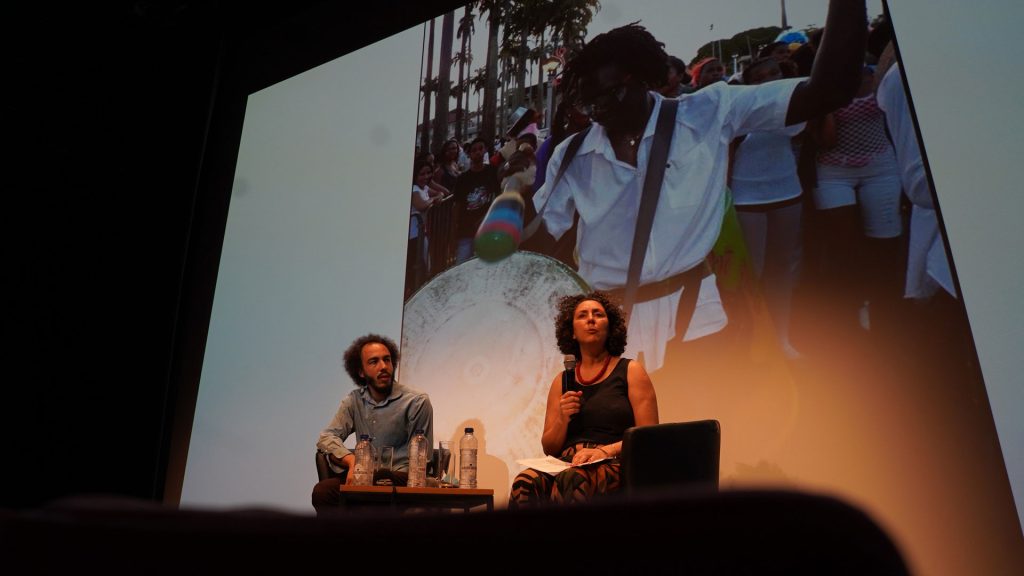
Maxime Jean-Baptiste and Samah Hijawi
Aesthetics of the Political
Reflection 1: June 14 & 15, 2020 – BOZAR
Critical images
with Samah Hijawi, Oraib Toukan, Mirna Bamieh, Ogutu Muraya, Miguel Peres dos Santos, Sabine Groenewegen, Maxime Jean-Baptiste, Sandra Heremans
Reflection 2: September 10, 2020 – PIANOFABRIEK
Speculative documentary school
with Rosine Mbakam (ac)
Reflection 3: November 25 & 26, 2020 – PIANOFABRIEK
Theory and practice, a single movement.
with Stoffel Debuysere
Reflection 4: February 3, 2021 – ISELP
Re-appropriation of images: Recollection
with Kamal Aljafari (ac)
Reflection 5: March 31, 2021 – BEURSSCHOUWBURG
Creation of new political subjectivities: Soil Calling
with Filipa César (ac)
Reflection 6: June 2, 2021 – PIANOFABRIEK
Memories of the colonial world and the fall of civilization: Cemetery
with Carlos Casas
Reflection 7: September 8, 2021- INSAS
In the name of what we move forward
with Jean-Pierre Rehm
Reflection 8: November 14 & 15, 2021 – BOZAR
Autobiography and body as political moments
with Ruth Somalo, Shuruq Harb, Sana Gobbeh, Baloji, Debbie Onuhoa, Hara Kaminara, Stijn Schiffeleers, Arkadi Zaides
REFLECTION 1 : Critical images
Decolonize images. Critical reflection on the effects of colonialism is growing slowly in Belgium and Europe. In places like the United States, some countries from Africa and India, the discourse is much more current and cutting-edge.
At the moment, discussion of works dealing with colonialism tends to focus on the historical and geographical context, rather than the aesthetic choices of artists that directly operate as critical forms of colonialism.
Two days of conference, films, lively discussions and a dinner performance. The latter will be the center of a reflection on the effects of colonialism on food and everyday life.
The programmed works resonate with each other.
Oraib Toukan and Miguel Peres Dos Santos will talk about using images to document an event. For example: How do I position myself in front of a photograph of a person injured in a bomb attack in country X? How to deal with the pain of others? Who am I in front of this other absent person, dead perhaps, unknown?
Artists: Samah Hijawi, Oraib Toukan, Mirna Bamieh, Ogutu Muraya, Miguel Peres dos Santos, Sabine Groenewegen, Maxime Jean-Baptiste, Sandra Heremans.
Presented by Samah Hijawi.
Samah Hijawi, artist and researcher is currently preparing her doctorate in artistic practice at ULB and the Royal Academy of Fine Arts in Brussels, Belgium.
Her works have been exhibited: at the M-Museum in Louvain, at the Royal Museums of Fine Arts of Belgium, at the Hayward Gallery in London, at the BOZAR and at the Beursschouwburg in Brussels, at the Bureau Europa, Maastricht, MoMa and Apex Art – New York; Darat al Funun – Amman.
With Ola El-Khalidi and Diala Khasawneh, she led the artist initiative Makan Art Space (2003-2015), an independent space for contemporary art in Amman.
With Shuruq Harb and Toleen Touq, she launched the platform The River Has Two Banks (2012-2017) to respond to the growing distance between Jordan and Palestine through a program of artistic and discursive events in different cities.
In collaboration with BOZAR Cinema, La chair Mahmoud Darwich, SABAM for Culture,
OMAM/ULB, kunstenwerkplaats vzw, Pianofabriek.
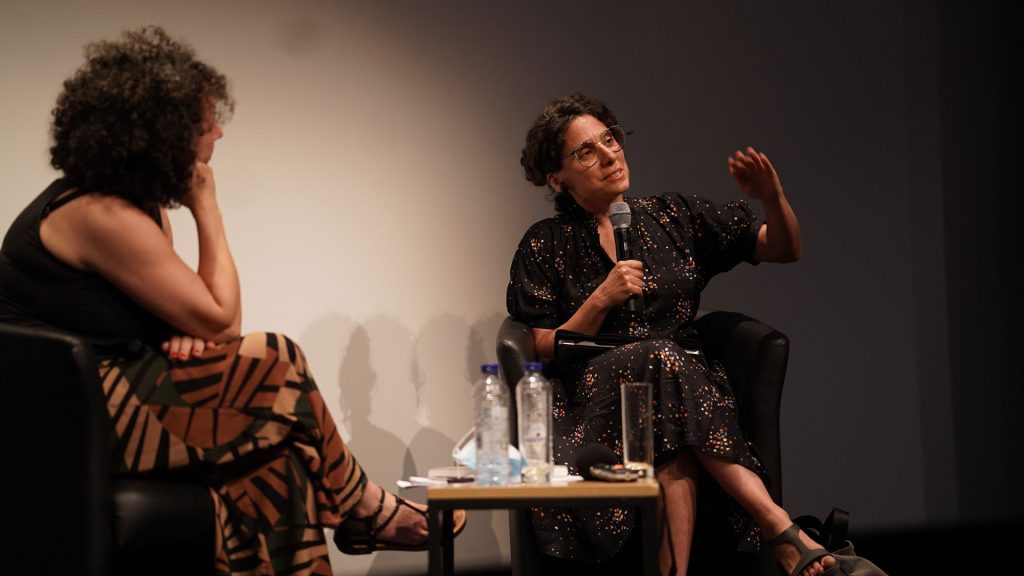
Samah Hijawi and Oraib Toukan
REFLECTION 2: school of speculative documentary
Paradox of the documentary act. Can we draw inspiration from the paradox according to which, as soon as we try to approach reality in a documentary way, it immediately evaporates and mutates?
How can we take responsibility for the mechanisms that determine what can or can be perceived, seen, heard, said, thought, done or not done?
And how do documentarians themselves manage their own positions of power and ‘blind spots’?
The School of Speculative Documentary was created at KASK, by Max Pinckers and Michiel De Cleene, theater director Thomas Bellinck and filmmakers An van Dienderen and Rosine Mbakam.
Rosine Mbakam presents their research and discusses her work as a filmmaker.
Rosine Mfetgo Mbakam was born in Cameroon in 1980 and began to gain experience in documentary film in the field of editing and directing within the Italian NGO COE. In 2003, she began producing audiovisual content for the television channel STV (Spectrum Television). In 2007, Mbakam left Cameroon to study cinema at INSAS Film in Belgium. In 2018, she founded Tândor Productions with Geoffrey Cernaix.
REFLECTION 3: Theory and practice, one movement
The act of filming as a place for the emergence of a theory and a politics. Theory and practice as one and the same entity.
‘When filmmakers organize themselves to start from scratch, to create a cinema with new types of scenarios, rhythms and poetry, they embark on the dangerous adventure revolutionary, learning while they produce, combining theory and practice, reformulating each theory with each practice, conducting themselves according to the apt saying of Nelson Pereira Dos Santos, a Portuguese poet: I don’t know where I’m going, but I know I won’t go there.’ – Glauber Rocha
Some cinema stories which aim to redraw the trajectories which frame a given landscape of reality, by undoing the knots and the lines through which the dominant stories are transmitted. Stories of invention and dissension, expressing an infinity of emotions, perceptions, movements, gestures and resistant looks.
Presented by Stoffel Debuysere.
Stoffel Debuysere is a researcher and programmer of cinema and audiovisual art. He is based in Brussels and has created numerous programs of films, screenings, performances and debates organized in collaboration with cultural organizations and institutions. He is part of the Courtisane collective and is a docent for film criticism at the Hogeschool voor de Kunsten in Ghent, where he defended his doctorate ‘Figures of dissent. (Cinema of Politics, Politics of Cinema)’
REFLECTION 4: Re-appropriation of images
The re-appropriation of images. What processes, what images? How to replay the images by expropriating them from the initial content? What is the relationship to initial content and intellectual property? How to decolonize images?
In his film Récollection, Kamal Aljafari uses Israeli and American films shot in Jaffa from the 60s to the 80s to give substance to the story of a dream. All the protagonists are erased to leave only the empty setting of the city. Who is filming? It is memory itself that films.
Kamal Aljafari is a Palestinian experimental film director born in Ramla in 1972. He studied at the Academy of Media Arts in Cologne and lives in Berlin.
In 2009, he participated in the Robert Flaherty cinematography seminar in New York and was
Benjamin White Whitney Fellow at Harvard University in 2009-2010.
Aljafari became a lecturer at the Academy of Cinematography and Television in Berlin, and was also a Radcliffe Fellow at the Center for Film Studies at Harvard University.
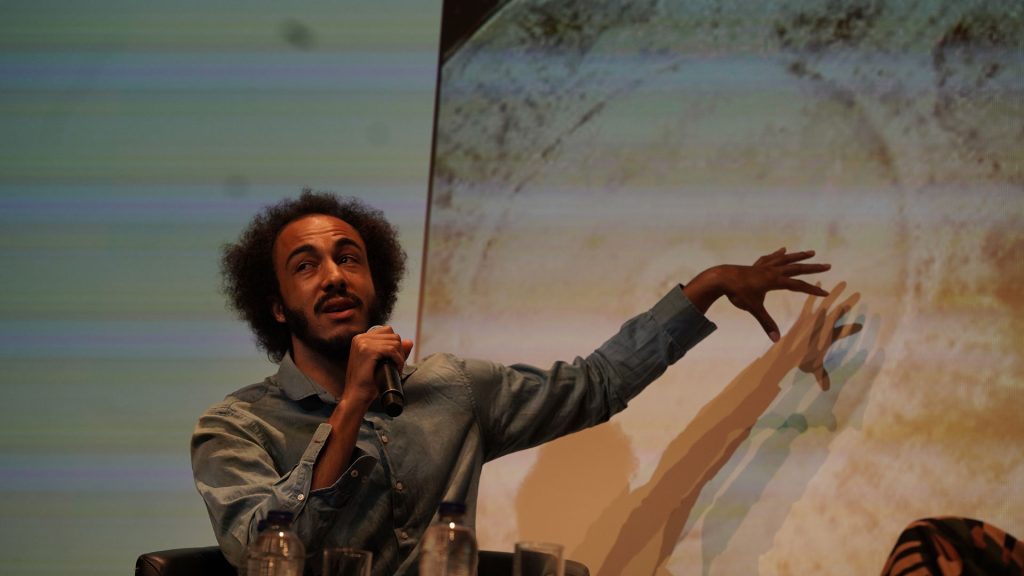
Maxime Jean-Baptiste
REFLECTION 5: Creation of new political subjectivities
The use of fictional operators (genre, character) to renew viewpoints on fossilized, colonial realities.
In the film ‘L’appel de la terre’ (Soil Calling), the Cadjigue collective (including Filipa César), develops the use of science fiction as a tool to open up new subjectivities with regard to the still raw wounds of colonial cultural appropriation.
Filipa César studied at the Faculty of Arts in Lisbon, the Academy of Arts in Munich and Berlin. She has exhibited at the Tate Modern, SF MOMA, Biennal de Sao Paolo. Her films have been shown at Locarno, Manifesta 8 Cartagena. Her practice considers media as a means of expanding or exposing narratives of resistance to historicism. Since 2011, César has been investigating the origins of cinema in Guinea-Bissau as part of the African Liberation Movement, its imaginaries and cognitive potentials, developing this research in the collective project Luta ca caba inda (the struggle is not yet over). In 2017, César presented her first essay feature Spell Reel in the Forum section of the 67th Berlinale.
REFLECTION 6: Memories of the colonial world and fall of civilization
Creations that break down the categories and taxonomy of industrial cinema. Creating new political forms. At the crossroads of visual arts, cinema and experimental film.
Presented by Carlos Casas
Carlos Casas (b. 1974, Barcelona, Spain) Film director and visual artist, his work combines documentary film, cinema and contemporary visual and sound arts. His films have been presented and awarded at festivals around the world, including the Venice Film Festival, Rotterdam International Film Festival, Buenos Aires International Film Festival, Mexico International Film Festival, FID Marseille, etc. … his work has been exhibited and produced in International art institutions and galleries, such as Tate Modern, London, Fondation Cartier, Palais de Tokyo, Centre Pompidou, Paris, Hangar Bicocca, Milan, CCCB Barcelona, GAM Torino, Bozar Brussels, among others.
REFLECTION 7: In the name of what we stand for
‘If FIDMarseille is rooted in documentary, it’s to remember the realities that are our soil, but without forgetting that on this soil grow many worlds and even more ways of bearing witness to them. And if bearing witness is a necessity, an urgency, it is with the awareness that it must find the courage, the accuracy, the joyful conviction too, to make heard and seen, what in the name of which it advances.’
Jean-Pierre Rhem presents and discusses films that bear witness to contemporary cinema, the cinema he sees developing.
Presented by Jean Pierre Rhem
Jean-Pierre Rehm has been director of the FID Marseille (Marseille International Film Festival) since 2001. He has also curated numerous exhibitions in France and abroad, and writes regularly for exhibition catalogs and various art and film magazines.
REFLECTION 8: Autobiography and the body as a political moment
(De)Colonial forms and narratives embedded in the body and sexuality.
The city as the body in which social and political tensions are projected. Speculative fiction.
An encounter around these questions.
Artists: Ruth Somalo, Shuruq Harb, Sana Gobbeh, Baloji, Debbie Onuhoa, Hara Kaminara, Stijn Schiffeleers, Arkadi Zaides
Presented by Ruth Somalo.
Ruth Somalo is a Spanish filmmaker, curator and researcher based in New York.
She is currently a programmer at DOC NYC, DocumentaMadrid and the Architecture and Design Film Festival. As an independent curator, she is interested in the Poetics of Fragility and the reclamation of a non-critical, non-anthropocentric space for the emotions. Recent programs include “Holy Fluids and Absent Wounds” and “Queer Utopias” (Union Docs) and the Flaherty NYC 2017 winter/spring series “Broken Senses” (Anthology Film archives).
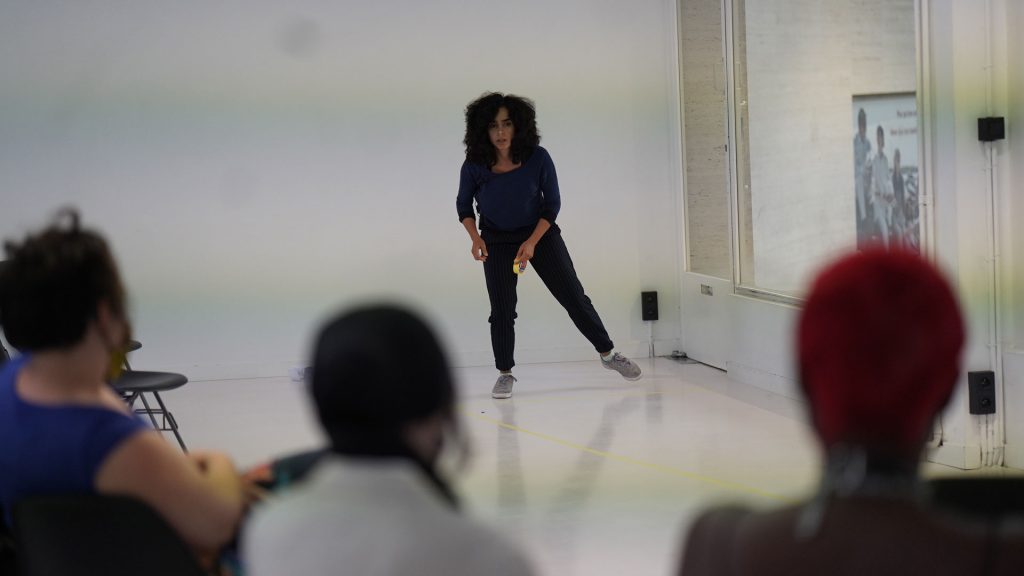
Sana Gobbeh
Speakers
SAMAH HIJAWI (CIS participant 2016)
Curator, moderation, performance. Samah Hijawi is an artist and researcher who prepares currently completing her doctorate in artistic practice at ULB and the Royal Academy of Fine Arts in Brussels, Belgium.
In her multimedia works, she studies the aesthetics of representation in works of art that refer to the history of Palestine.
Her works have been exhibited: at the M-Museum in Louvain, at the Royal Museums of Fine Arts of Belgium, at the Hayward Gallery in London, at the BOZAR and at the Beursschouwburg in Brussels, at the Bureau Europa, Maastricht, MoMa and Apex Art – New York; Darat al Funun – Amman.
With Ola El-Khalidi and Diala Khasawneh, she led the artist initiative Makan Art Space
(2003-2015), an independent space for contemporary art in Amman.
With Shuruq Harb and Toleen Touq, she launched the platform The River Has Two Banks
(2012-2017) to respond to the growing distance between Jordan and Palestine with a program of artistic and discursive events in different cities.
Samah Hijawi lives and works in Brussels.
ORAIB TOUKAN
‘When Things Occur’ is based on Skype conversations with the people of Gaza who were behind the images beamed across screens in the summer of 2014. The film explores the face of mourning and grief – its incarnation, transmission and digital representation. He questions how the gaze is channeled in the digital world and how empathy spreads.
What exactly does it mean to look at suffering ‘from a distance’?
What is the behavior and political economy behind the image of war?
And who is the ‘local’ in the representation of war?
Oraib Toukan is an artist and EUME fellow at the Forum Transregional Studien in Berlin. She holds a doctorate in fine art from the University of Oxford, Ruskin School of Art.
Until fall 2015, she headed the arts division and media studies program at Bard College, Al Quds University, Palestine. She was a guest professor at the International Academy of Fine Arts in Ramallah. Between 2015 and 2017, she taught on the University of Oxford’s Higher Education program at the Ruskin School of Art.
In autumn 2018, she was a Mercator Fellow in the Cultures of Criticism program at Leuphana University in Lüneburg.
Toukan is the author of Sundry Modernism: Materials for a Study of Palestinian Modernism
(Sternberg Press, 2017) and the essay film When Things Occur (2016).
Since 2011, she has analyzed and produced remakes from a collection of film reels that belonged to the now dissolved Soviet Jordanian cultural centers in 1990-1991.
MIGUEL PERES DOS SANTOS (SIC 2014 participant)
‘There are no more images’ (2016). A reflection on the possible link between image and memory; between the image and the moment; and between image and death. A father, a son and a dead child engage in a monologue constructed from a moment: ‘is an image dead?’; and if an image dies… what will happen to the memory?’
Miguel Peres dos Santos was born in 1976 in Lisbon, Portugal. By emphasizing forms, Peres dos Santos reflects on themes closely linked to archives and memory. His works radiate a cold and latent violence and have a disconcerting beauty. His work shows how life extends beyond its own subjective limits and often chronicles the effects of global cultural interaction during the second half of the 20th century.
Miguel Peres dos Santos lives and works in the Hague.
SABINE GROENEWEGEN (CIS participant 2015)
Through a combination of found footage, science fiction and poetry, Odyssey interrogates the visual rhetoric of whiteness in the Dutch colonial project in particular and questions the stories we are told, as well as the possibilities we have to tell them.
‘Odyssey’ (2018). Two undefined intelligences intercept Earth images of humans living in an area known as the Netherlands. Researchers exchange their results through a visual stream, in an attempt to understand the appearance of these extraordinary creatures: men. The spectators’ efforts to understand an enchanted human world are interrupted by another signal that imposes itself on the ongoing investigation, leading to a play with the logic of meaning production.
Sabine Groenewegen is an artist who works with moving images, collages and immersive experiences. She is currently exploring how the experiences of our ancestors are part of our present and future psychobiological reality.
SANDRA HEREMANS (2015 SIC participant)
Reflective conversation. Sandra Heremans (*1989, Rwanda) is an art historian and filmmaker. In her master’s thesis, she focused on the power and representation of symbol in Aby Warburg’s theory of art.
Heremans later discovered experimental cinema and made her first short film
The Yellow Mazda and His Holiness (2018). Sandra Heremans is based in Brussels.
MIRNA BAMIEH
‘Palestine Hosting Society’ is a living art project where artist and cook Mirna Bamieh seeks to examine food culture in Palestine, aiming to construct and reconstruct, through food, the relationships between place, history, society and politics. Research takes place through eating, reading and discussing. Culinary interventions clarify social concerns and limitations in the face of contemporary political dilemmas, making us reflect on the conditions that characterize contemporary Palestinian communities.
Mirna Bamieh is an artist from Jerusalem/Palestine. She obtained a bachelor’s degree in psychology from Birzeit University in Ramallah (2002-2006). a Masters in Fine Arts from the Bezalel Academy of Arts and Design in Jerusalem (2011-2013) and a diploma from Ashkal Alwan HomeWorks in Beirut (2013/14). His work attempts to understand and contemplate constantly evolving politics, while questioning notions of land and geography in the intervening years. His work is more interested in scenarios that take the language of the absurd and irony and use them as tools of political commentary. Currently, she is developing works that use storytelling and food to create situational performances such as: Potato Talks Project, Palestine Hosting Society.
MAXIME JEAN-BAPTISTE (SIC participant 2018/19)
The ‘Kouté vwa’ project has as its starting point the participation of Maxime’s father in a French film “Jean Galmot aventurier”, the screenplay of which is based on the character of Jean Galmot (1879-1928), as well as on the Affaire of the Cayenne Insurgents (1928-1931). This case is a historic event that led to the radicalization of the Guyanese people, an uprising, a long trial and finally the release of the accused. Today, Maxime questions this colonial representation in which his father was an extra. His project interweaves specific micro-stories with the film’s former participants, the real-life descendants, as well as members of his own family.
Maxime Jean-Baptiste (°1993, FR) is a director and performer based in Brussels and Paris. Having lived in the context of the Guyanese-Antillean diaspora in France, born to a French mother and a Guyanese father, his work as an artist is seen as an exploration of the complexity of Western colonial history by detecting survival past traumas in the present. His audiovisual and performative work focuses on portraits (of artists, dancers or members of his own family) using the form of reconstruction to conceive the potential of a living and oral memory. He obtained a bachelor’s degree in visual arts at erg and a master’s degree in media arts at K.A.S.K. School of Arts (Ghent, BE).
OGUTU MURAYA
‘The Politics of the Invitation’ Online conversation. Ogutu Muraya (°1986 in Kenya) is an author, director and storyteller. For him, art is an important catalyst for questioning his beliefs and for keeping alive the stories told in error or hidden from the mainstream. His works have been exhibited at numerous festivals: among others at La Mama (NYC), HIFA (Harare), Afrovibes Festival (Amsterdam) and Spielart Festival (Munich). Ogutu Muraya lives and works in Nairobi.
ROSINE MBAKAM
The School of Speculative Documentary and ‘The Two Faces of a Bamiléké Woman’
Rosine Mfetgo Mbakam was born in Cameroon in 1980 and began to gain experience in documentary film in the field of editing and directing within the Italian NGO COE. In 2003, she began producing audiovisual content for the television channel STV (Spectrum Television). In 2007, Mbakam left Cameroon to study cinema at INSAS Film in Belgium. In 2018, she founded Tândor Productions with Geoffrey Cernaix.
STOFFEL DEBUYSERE
Theory and practice, a single movement.
Stoffel Debuysere is a researcher and programmer of cinema and audiovisual art. He is based in Brussels and has created numerous programs of films, screenings, performances and debates organized in collaboration with cultural organizations and institutions. He is part of the Courtisane collective and is a docent for film criticism at the Hogeschool voor de Kunsten in Ghent, where he defended his doctorate ‘Figures of dissent. (Cinema of Politics, Politics of Cinema)’.
KAMAL ALJAFARI
‘Recollection’ (2015). ‘Israeli and American films shot in Jaffa from the sixties to the nineties give substance to the story of a dream. All the protagonists are erased from the original images, leaving behind only the empty setting of the city. Someone returns to Jaffa, as they might return to any other place after a disaster. He knows everything. This someone is me, it’s my grandparents who were on their way to Beirut and had to come back because there was a storm, it’s a photographer, it’s a composite of all the marginal figures. It is memory itself that films. The memory of the entire background saved from the screen.’
Kamal Aljafari, born in Palestine in 1972, lives in Berlin. He works with still and moving images, interweaving fiction, non-fiction and art. His other films include Visit Iraq (2003), The Roof (2006), Balconies (2007), It’s a Long Way from Amphioxus (2019). He was a guest artist at the Robert Flaherty Film Seminar (NYC) and a member of the Radcliffe Institute and Film Study Center at Harvard University.
FILIPA CESAR
‘Tchon Tchomal’ is an experimental case study that Coletivo Cadjigue is developing as a radical science fiction film which, through humor and finesse, aims to open up several positions and subjectivities on the old, still raw wound of the colonial cultural appropriation.
Filipa César (°1975, lives in Berlin) is an artist and filmmaker interested in the politics and poetics inherent in the moving image. His practice views media as a means to expand or expose narratives of resistance to historicism. Since 2011, César has looked at the origins of cinema in Guinea-Bissau as part of the African Liberation Movement, its imaginations and its cognitive potentials, developing this research in the collective project Luta ca caba inda (the struggle is not not yet finished). In 2017, César presented his first feature-length essay Spell Reel at the Forum section of the 67th Berlinale. Since 2018, César has been an honorary member of Coletivo Cadjigue. She has participated in numerous film festivals, including Kurzfilmtage Oberhausen, 2013 and 2016; Curtas Vila do Conde, 2012-2015; Forum Expanded – Berlinale, 2013, 2016 and 2017; IFFR, Rotterdam, 2010, 2013 and 2015; DocLisboa, 2011 and 2017; Cinéma du Réel, Paris 2018. Among its exhibitions and screenings: 29th Biennale of São Paulo, 2010; Manifesta 8, Cartagena, 2010; Contour 8 Biennial, Mechelen and Gasworks, London; Flaherty Seminar, New York; MoMA, New York, 2017; Harvard Art Museums, Boston, 2018; Luleå Biennale; BIM, Buenos Aires, 2018; Haus der Kulturen der Welt, Berlin, 2011-2015-2019; Calouste Gulbenkian Foundation 2019. Colectivo Cadijgue / Filipa César Tchon Tchomal / Soil Calling
(currently researching)
CARLOS CASAS
‘Cemetery’ (2019). A film about memory, colonialism, discovery, the loss of innocence, the collapse of civilization, the disappearance of all sanctuaries and unexplored territories. A road movie about elephants, a sound film guided by a voice-over monologue, the astonishing sounds of the jungle and deep sound research linked to the sound language of the elephant. The film is a requiem for the unknown, for the undiscovered, for the elephant cemetery, for our shangrila.
The elephant graveyard is our bardo; they tolerate our black hole, between our lives, the place where we must arrive to migrate to our next stage.
Carlos Casas (b. 1974, Barcelona, Spain) Film director and visual artist, his works combine documentary film, cinema and contemporary visual and sound arts. His films have been presented and won awards at festivals around the world such as the Venice Film Festival, the Rotterdam International Film Festival, the Buenos Aires International Film Festival, the Mexico International Film Festival, FID Marseilles, etc. …his work has been exhibited and produced in International art institutions and galleries, such as Tate Modern, London, Fondation Cartier, Palais de Tokyo, Center Pompidou, Paris, Hangar Bicocca, Milan, CCCB Barcelona, GAM Torino, Bozar Brussels, among others.
JEAN-PIERRE RHEM
In the name of what we stand for
Jean-Pierre Rehm has been the director of the FID Marseille (Marseille International Film Festival) since 2001. He is also the curator of numerous exhibitions in France and abroad and regularly writes for exhibition catalogs and various film magazines. art and cinema.
RUTH SOMALO
Ruth Somalo is a Spanish filmmaker, curator and researcher based in New York.
She is currently a programmer at DOC NYC, DocumentaMadrid and the Architecture and Design Film Festival. As an independent curator, she is interested in the Poetics of Fragility and the reclamation of a non-critical and non-anthropocentric space for emotions. His latest programs include “Holy Fluids and Absent Wounds” and “Queer Utopias” (Union Docs) and the Flaherty NYC 2017 winter/spring series “Broken Senses” (Anthology Film archives).
Ruth’s latest films are built around taboos of the female body, gender-specific illnesses and patriarchal structures in the medical establishment, narrative medicine and the economy of death, human remains and experiences of loss . His work has been presented in theaters, festivals and museums internationally, including the Verdi Cinema Theater and Contemporary Art Center Matadero in Madrid, the San Sebastian International Film Festival, Cinéma du Réel (Paris), at ADFF (NY), L’Alternativa (CCCB Barcelona), Documentamadrid, MOMA PS1 (Expo1) and the EYE Film Institute in Amsterdam (Spanish Cinema Without Fear).
She is also writing her doctoral dissertation and often works as a guest speaker and nonfiction project mentor. Her current research project “Mending Objects” investigates the experience of loss through first-person documentaries and experimental non-fiction projects.
SANA GOBBEH
‘We dream unsynchronized’ is based on the idea of intensifying space. During the performance, the artists create the space through repetitive actions. Performance reflects poor communication in the context of daily life. Sana Ghobbeh is a visual artist, performance artist and architect who lives and works in Brussels. In 2016, she continued her practice-based research in the a.pass (advanced studies in performance and scenography) research environment in Brussels. From 2013 to 2015, she was awarded a scholarship to undertake artistic research at the Umeå School of Architecture (UMA) in Sweden.
SHURUQ HARB
‘The White Elephant’ (2017). Based on videos from the 1990s found on the Internet, Shuruq Harb imagines the stream of consciousness of a Palestinian teenager and her concerns about friendship and romance in the political climate of the Oslo Accords. Between the loss of a friend, an activist in the first Intifada, and her distrust of a boyfriend who steals Israeli cars while claiming it is a political gesture, the teenager observes, doubts and suspends her judgment. The film’s semi-autobiographical inspiration comes into tension with its Israeli pop culture sources: the Gulf War, the first Intifada and the trance music scene which, in Tel Aviv, offered young IDF soldiers a chance decompression. The filmmaker takes a critical look at this culture whose distorting mirror makes it difficult for a developing young person to identify. The only thing that allows her to temporarily forget the division is the rave party – “72 hours of musical madness”, where she can pose as an Israeli. “We all wanted to escape from something, him as a soldier, to make us disappear…” A personality is generated by figures who escape any attributed identity, such as Dana International, the Israeli singer of Yemeni origin who was the first trans person to win the Eurovision contest – a mix of origins and a physical transformation mark an approach to editing that fragments more than it constructs: “When you take something apart, how do you know what was it at the beginning? (Charlotte Garson)
Shuruq Harb is an artist, writer and curator living and working in Ramallah.
HARA KAMINARA (SIC participant 2018/19)
‘Atlas’ (working title). On board the Aquarius, as a photographer, Hara meets Max.
Max is head of the team that rescues migrants at sea. They make a few trips together. Struck by the traffic ban imposed on the boat which loses its flag allowing it to dock, condemned to stay on land, Hara decides to make a film. A letter to the child she is expecting from Max. Into this letter are woven Hara’s personal memories, her meeting with Max and certain stories heard on the boat. Migrants recount their journeys, their lost homes. Is there a common bond between us? Is there a common history?
Hara Kaminara is a photographer and activist who lives between Marseille and Brussels.
ARKADI ZAIDES (SIC participant 2018/19)
‘The Cloud’. On April 26, 1986, reactor No. 4 at the Chernobyl nuclear power plant exploded following poor tests and the operators’ loss of control. The burning graphite cloud initially headed northwest toward Sweden, Finland and Eastern Europe, exposing the population to levels of radioactivity up to 100 times normal background radiation. In Gomel, a town in Belarus located 140 km from the source of the radiation, life continues despite the radioactive threat. It is the context of a reunion between two friends who have not seen each other for more than twenty-five years.
Arkadi Zaides returns to his hometown to meet a childhood friend who never left the region due to his fear of heights and flying. The project is woven according to a constant dichotomy and passes through two parallel lines: two people, two states of mobility, two types of ruptures – the rupture in friendship as well as the collective rupture caused by the ecological catastrophe. It is the story of the separation of two friends darkened by a radioactive threat. The scenes of the two’s encounters are intertwined with surreal scenes shot at the very site of the Chernobyl explosion.
Arkadi Zaides is an independent choreographer. Born in 1979 in Belorussia, former USSR, he immigrated to Israel in 1990 and currently lives in France.
DEBBIE ONUHOA (CIS participant 2018/19)
‘The A-team’. During phone conversations, Debbie, along with her former classmates, attempts to piece together memories of a high school exchange trip to Mississippi. For them, the bizarre encounters that followed became a crash course in American history and race relations. With each new detail shared, their memory of the visit shifts from nostalgia to an increasingly troubled memory. Likewise, the still and drawn images that constitute the film’s visual layer, as well as the soundscape, shift from the idyllic to the absurd.
Debbie Onouho is interested in questions of memory, and in the construction of both personal and official histories. Currently his work focuses on filming ghosts, silences and hidden things in museums, archives and heritage spaces. She earned an MFA in documentary filmmaking in 2018 from DocNomads, the mobile film school jointly administered by Universidade Lusofona (Portugal), Szinhaz es Filmuveszeti Egyetem (Hungary) and LUCA arts school (Belgium). She holds an MPhil in World History from the University of Cambridge and a BA in History, Literature and Anthropology (with a minor in Film and Video) from Harvard University. She currently lives in Germany, where she works as a visual anthropologist at the Humboldt Universität in Berlin.
STIJN SCHIFFELEERS (SIC participant 2018/19)
‘Neither seen nor known’ (working title). An experimental documentary film that starts with a pair of “before and after” daguerreotypes to dig through different layers of forgetting. Made in 1848 with the explicit intention of rushing them to publication, these images show seemingly desolate barricades before and after a clash between revolutionaries and the French National Guard. The exposure time made it impossible to capture the real event, but the gap between these two distinct photographs creates a cinematic space where visible and invisible impressions collide.
It is from this space that the project looks at our continued need for complex interpretive processes, focusing on how aspects of invisibility can lead to fear and more specifically on how working class is distorted and made invisible. Mixed with personal images and elements of fiction, the film explores the myths around class and examines the struggle for recognition and visibility.
Stijn Schiffeleers is a multimedia artist and co-founder of Boutique Vizique, a Belgium-based platform that uses installations and soft technology for artistic experimentation.
BALOJI
Baloji is a moving artist, a musician, a poet, a film director, a man of images and ideas.
He is on the move like the inhabitants of Avenue Kaniama in Lubumbashi. In motion like the synthetic afro beats he produces, the result of an improbable alliance between rockrumba and futuristic funk. In perpetual movement, like his members on stage while he leads the Kaniama Show group, leading them into a sensual voodoo trance.
In motion like the era captured by his pen, an era where the intimate and the political meet and clash.
Baloji means ‘man of science’ in Swahili, but during the colonial period, this meaning changed following Christian evangelization, to mean ‘man of occult sciences’ then ‘sorcerer’.
Baloji was born in Lubumbashi (DRC Congo) and grew up in Belgium. As a teenager, he founded his first rap collective, Starflam. In 2008, under the name Baloji, he released ‘Hotel Impala’, an album conceived as a response to a letter he received from his mother after an absence of 25 years.
Baloji directs his own videos and creates the visuals for his various projects. His first fiction short film, ‘KANIAMA SHOW, was released in 2018. In 2019, his film ZOMBIES won the main prize at the 2019 Oberhausen International Short Film Festival and received the Prix Festivals Connexion – Auvergne-Rhône-Alpes in Clermont-Ferrand.
